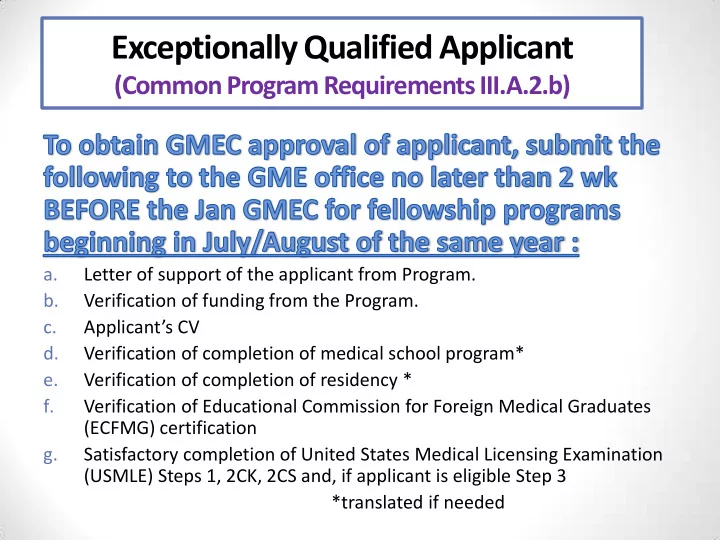

Exceptionally Qualified Applicant (Common Program Requirements III.A.2.b) a. Letter of support of the applicant from Program. b. Verification of funding from the Program. c. Applicant’s CV d. Verification of completion of medical school program* e. Verification of completion of residency * f. Verification of Educational Commission for Foreign Medical Graduates (ECFMG) certification g. Satisfactory completion of United States Medical Licensing Examination (USMLE) Steps 1, 2CK, 2CS and, if applicant is eligible Step 3 *translated if needed
Exceptionally Qualified Applicant (Common Program Requirements III.A.2.b) www. usmle .org/ step - 2 -cs/
Exceptionally Qualified Applicant (Common Program Requirement III.A.2.b)
Exceptionally Qualified Applicant (Common Program Requirements III.A.2.b) Applicants accepted by this exception must complete fellowship Milestones evaluation (for the purposes of establishment of baseline performance by the Clinical Competency Committee), conducted by the fellowship program, within 12-weeks of matriculation . The 12-week Milestones assessment must be provided to the GME Office upon completion. If trainee does not meet expected levels of Milestones competency, the trainee will undergo a period of remediation, overseen by the CCC and monitored by the GMEC through the EMS. This period of remediation must not count toward time in fellowship training. The program director must inform the fellow in writing the need for extended training and documentation be retained in fellow’s file.
Exceptionally Qualified Applicant (Common Program Requirements III.A.2.b) Progress of the trainee must be documented in the APE under Program Outcomes/Resident performance (for EACH year of training) and will be reviewed annually during the programs’ Annual Program Review (APR) by the EMS.
Eligibility Exception Decisions by Specialty Allow Eligibility Specialty/Subspecialty Exceptions Allergy and Immunology* Yes Anesthesiology Subspecialties Yes Dermatology Subspecialties Yes Diagnostic Radiology Subspecialties Yes Emergency Medicine Subspecialties Yes Family Medicine Subspecialties Yes Internal Medicine Subspecialties Yes Medical Genetics Subspecialties No Neurological Surgery Subspecialties No Neurology Subspecialties No Nuclear Medicine* Yes Obstetrics and Gynecology Subspecialties No Ophthalmology Subspecialties Yes Orthopaedic Surgery Subspecialties Yes Otolaryngology Subspecialties No Pathology Subspecialties Yes Pediatrics Subspecialties Yes Physical Medicine and Rehabilitation Subspecialties No Plastic Surgery Subspecialties No Preventive Medicine Subspecialties Yes Psychiatry Subspecialties No Radiation Oncology Subspecialties No Surgery Subspecialties No Thoracic Surgery Subspecialties No Urology Subspecialties No Common Program Requirements Section III.A. * The Review Committee does allow the exception to the eligibility requirements specified in Section III.A.2.b) for residency programs that require completion of a prerequisite residency program prior to admission.
Recommend
More recommend